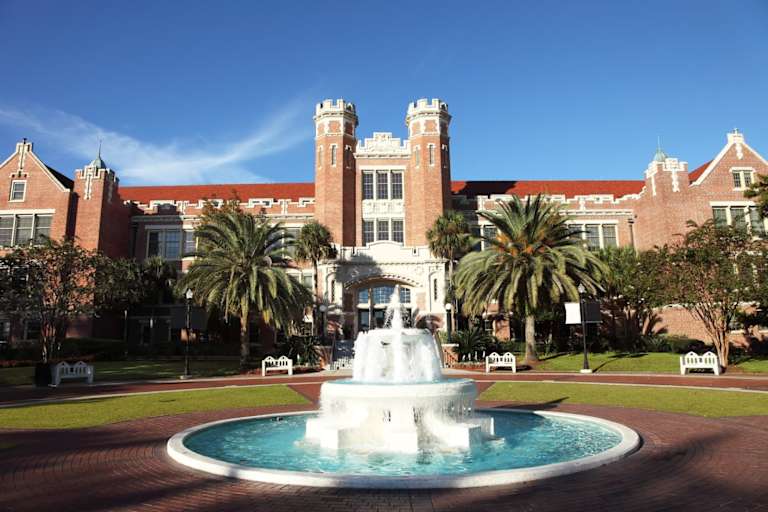Florida In-State vs. Out-of-State Tuition
- Students can save money on college in Florida by attending an in-state school.
- Out-of-state tuition in Florida can be four times more expensive than the in-state rate.
- Florida has the cheapest average in-state tuition rate in the U.S., at less than $5,000.
- Online students may be able to pay in-state rates regardless of where they live.
The average cost of college has reached record highs in the last few years. On average, students pay almost $20,000 a year just for tuition. And with student loan debt relief continually out of reach, it’s no wonder that affordability is a top factor when it comes to choosing a college.
One way to cut costs is to attend a public college — these schools usually offer cheaper tuition than private schools. Another way to save? Attend a school located in the state where you have residency. Most schools charge in-state students dramatically lower tuition than out-of-state students.
Read on to find out how much you could save by attending an in-state college in Florida.
Understanding In-State vs. Out-of-State Tuition
Attending an in-state school can mean thousands in savings compared to attending an out-of-state school. Public colleges typically charge much less in tuition costs for in-state vs. out-of-state students, though some schools may extend their in-state rate to students from neighboring states or students attending online.
Private schools are much more likely to have the same tuition rate regardless of residency status. Private schools typically cost much more than public schools, so tuition costs at a private college may be pretty similar to out-of-state rates at a public school.
Does Out-of-State Tuition Apply to Online Degrees?
Online colleges in Florida work a little differently. While some might follow the in-state vs. out-of-state tuition model, it’s much more common for online programs to charge the same rate to every student regardless of residency. Online students typically pay a set price per credit, which may be called the “in-state” rate (though you don’t need to live in-state to receive it).
Florida In-State vs. Out-of-State Tuition: Comparing the Costs
| Institution Type | Average In-State Tuition and Fees (2020-21) | Average Out-of-State Tuition and Fees (2020-21) |
|---|---|---|
| Public (4-Year) | $4,541 | $18,322 |
| Private (4-Year) | $28,860 | $28,860 |
On average, public colleges in Florida cost less than $5,000 per year for in-state students as of 2021. Out-of-state students saw a bill over four times higher than their in-state counterparts. Private colleges in Florida were the most expensive option, costing a full $10,000 more than out-of-state tuition at a public school.
How Does Florida Tuition Compare to Other Southeastern States?
| State | Average In-State Tuition and Fees (2020-21) | Average Out-of-State Tuition and Fees (2020-21) |
|---|---|---|
| Florida | $4,541 | $18,322 |
| Alabama | $10,617 | $27,005 |
| Georgia | $7,525 | $23,430 |
| Mississippi | $8,642 | $20,160 |
| North Carolina | $7,260 | $23,136 |
| South Carolina | $12,544 | $33,055 |
| Tennessee | $10,271 | $25,046 |
According to 2020-2021 data from the National Center for Education Statistics (NCES), Florida has the cheapest tuition costs in the southeastern region for both in-state and out-of-state students. Florida also has the lowest in-state tuition rate of any state in the entire country, and only one other state even charged below $6,000 that year.
10 Popular Florida Colleges: In-State vs. Out-of-State Tuition
| School | In-State Tuition and Fees (2022-23) | Out-of-State Tuition and Fees (2022-23) | Public or Private |
|---|---|---|---|
| Embry-Riddle Aeronautical University | $40,564 | $40,564 | Private |
| Florida Atlantic University | $4,879 | $17,324 | Public |
| Florida Institute of Technology | $42,346 | $42,346 | Private |
| Florida International University | $6,565 | $18,963 | Public |
| Florida State University | $5,656 | $18,786 | Public |
| Nova Southeastern University | $36,300 | $36,300 | Private |
| University of Central Florida | $4,478 | $19,810 | Public |
| University of Florida | $6,381 | $28,659 | Public |
| University of Miami | $52,080 | $52,080 | Private |
| University of South Florida | $6,410 | $17,324 | Public |
In-state tuition at popular Florida schools ranges from less than $5,000 per year to over $50,000 at the University of Miami. Out-of-state tuition starts at around $17,000 per year. On average, private schools come with a much higher price tag than public schools.
How Much Is College in Florida?
With the cheapest average in-state tuition ($4,521) in the U.S., Florida is a great choice for residents hoping to get a good deal on a college education. With 28 schools in the Florida College System, prospective students have plenty of low-cost public options to choose from.
Florida ranks about middle-of-the-pack when it comes to overall cost of living, however, according to 2023 data from the Council for Community and Economic Research. Look for resources for students in Florida that can help alleviate some of the housing and healthcare costs, such as grants and low-cost loans.
Frequently Asked Questions About Florida Tuition
What is the most affordable college in Florida?
The cheapest college in Florida is the University of North Florida, with an average annual net price of $7,746 in 2021, according to NCES data. This public university is located in Florida’s largest city and has a student population of about 16,000.
Florida Atlantic University comes in second with an average annual net price of $8,771 in 2021, according to NCES. Located in one of Florida’s best college towns, Boca Raton, this affordable public research university has less of an urban feel than UNF but is double the size at close to 30,000 students.
Can I get in-state tuition if I live out-of-state?
You may qualify for in-state tuition if you study online, at a private college, or if you live in a state that participates in a regional reciprocity agreement.
Out-of-state students from the South may be able to pay in-state tuition at some Florida schools depending on their course of study, as Florida participates in the Southern Regional Education Board Academic Common Market.
Why is out-of-state tuition so expensive?
Public colleges are partly funded by state and local taxes, so in-state students receive a discounted tuition rate since they — or their families — have already helped fund the school through their tax dollars. Out-of-state students are charged more since they haven’t paid any tax dollars to the school.
Explore More College Resources

Best Colleges in Florida + Full List of Schools
Check out our guide to the best colleges in Florida to learn about education options and career paths in the Sunshine State.

by Reese Lopez
Updated August 19, 2024

Cheapest Colleges in Florida
You can earn a degree in Florida without going broke. Check out our guide to the cheapest colleges in Florida to learn more.

by Reese Lopez
Updated October 13, 2023

